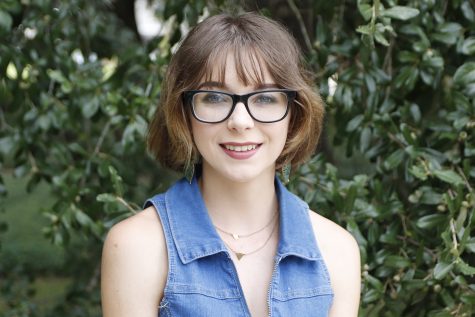
Sophomore Communication major Brian Williams played the saxophone as part of the Southeastern Jazz Ensemble. Annie Goodman/The Lion's Roar
The Southeastern Jazz Ensemble performed their first concert of the semester featuring students as soloists throughout.
“We have some talented students here,” said Lecturer of Percussion and Co-Director of the Jazz Ensemble Michael Brothers. “We’re really in the process of rebuilding the jazz program. One of the most legendary jazz figures of all times, Bill Evans, is an alum of this university and this program. So, we’re really trying to create something to honor him and to get some momentum behind that. Having an audience behind us really helps build that momentum. It helps build the program.”
According to Brothers, the Jazz Ensemble performances focus on pieces to improve the students rather than following a central theme.
“I don’t know if there was a theme,” said Brothers. “There never really is a theme at any of these concerts. We go through all kinds of different material and what suits the personality. Every given semester we try to tailor it to that. There’s not an overriding theme of using one composer, one style. We try to mix up the styles. So every semester, they work with something a little bit different every time. So, they get greater exposure to more styles within the jazz idiom.”
Lecturer of Double Bass and Co-director of the Jazz Ensemble John Madere and Brothers began finding music last semester. Brothers explained the reasoning behind one of the song choices.
“It started last fall trying to pick things that we hadn’t done before,” said Brothers. “Bill Holman writes very differently than most jazz composers. He writes, what we call, in a linear fashion. He doesn’t write in a block chord style. That type of writing was something these students hadn’t worked with before. I chose that chart on purpose so they’d have an opportunity to play something that was completely different than what they had before.”
Brothers enjoys working with the Jazz Ensemble for more than the music.
“Besides the music, working with the students and trying to get them to really appreciate jazz on a much deeper level than they’ve been exposed to in the past,” said Brothers. “Not only to understand the historical context of each piece that we’re working on, but the different styles and dig into music. The different articulations, different phrasings, different harmonies they may be working on so they have a broader base of what they’re exposed to within a very narrow focus.”
Brothers believes it is important for Americans to experience jazz music as inhabitants of its native country.
“The most important reason, obviously to support arts and music, but I think one thing people forget that tends to get lost, and I’ve said this countless times, jazz is America’s only native art form,” said Brothers. “It is our contribution to the world. So, I think its very important to support it and to go out and hear it.”


